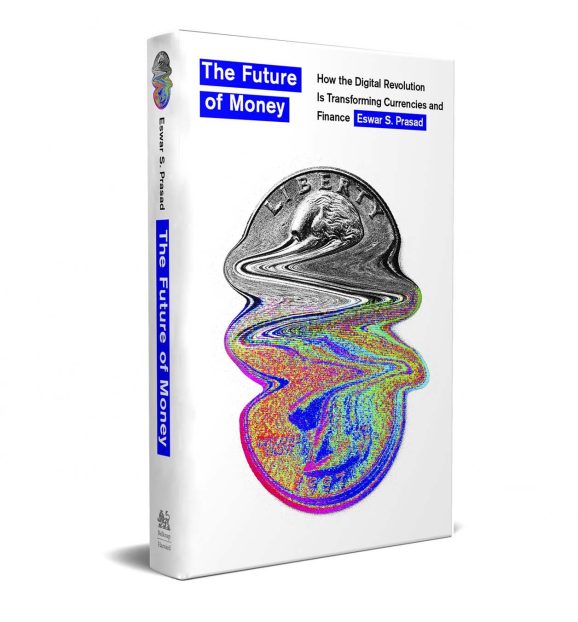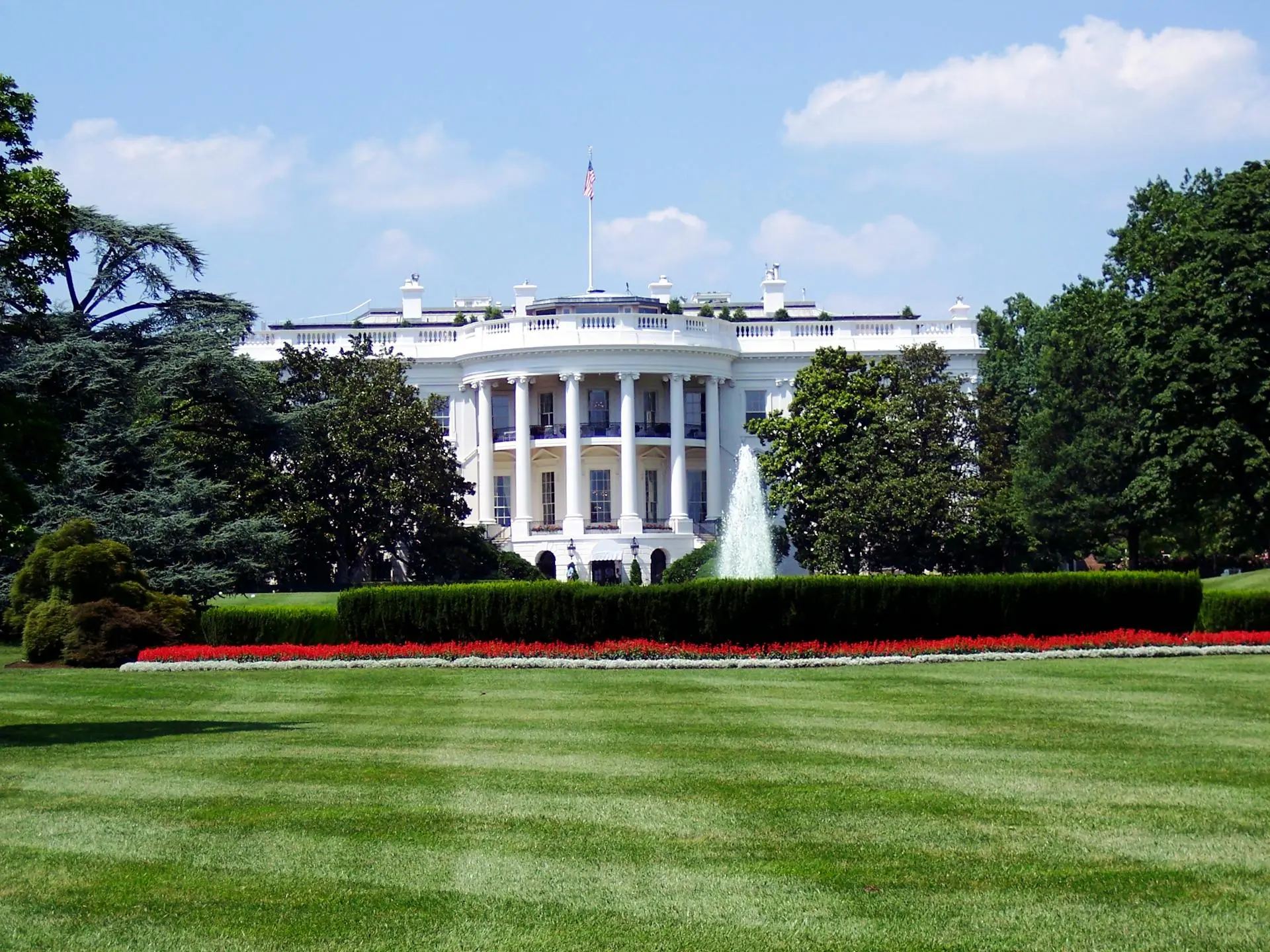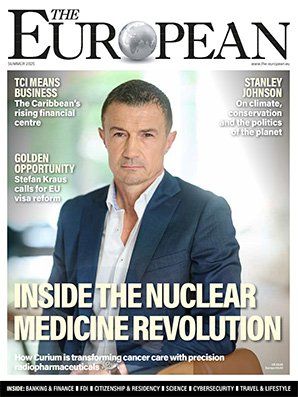Dawn of a new financial landscape

John E. Kaye
- Published
- Banking & Finance, Home

In his new book, Cornell academic Eswar Prasad explores the dizzying rise of cryptocurrencies and the end of cash as we know it – Alex Katsomitros finds out more..
When Eswar Prasad, an Indian-American economist, visited the Norwegian central bank in 2019 to deliver a lecture, he noticed a sign at the front desk of his hotel, advising guests that cash payments were not accepted. Prasad pointed out to the hotel staff that this was illegal, but they politely dismissed his concerns – everybody was paying by card anyway.
Towards a cashless society
The incident is symbolic of our shifting attitudes towards money, notes Prasad in his recently published book The Future of Money: How the Digital Revolution Is Transforming Currencies and Finance. Prasad, who teaches at Cornell University, had started writing a book on the impact of financial technology on central banks and monetary policy when he realised that fintech innovation and digital currencies were drastically changing the nature of money. For example, technology, with a little push from the pandemic, has accelerated the end of our love-hate relationship with physical money. “Cash is on its way out,” Prasad declares, predicting that “digital payment systems and currencies will become the norm.” In some countries like Norway, this is already true. In Sweden, only 6% of payments were made in cash in 2020.
Although Prasad acknowledges that the disappearance of cash could hit the poor, the digitally illiterate and the elderly, he is optimistic that e-money will increase financial inclusion. As an example, he cites developing countries such as Kenya where mobile payment technology has enabled people to access banking services for the first time.
Sovereign digital currencies
For the powers that be, cryptocurrencies have been a tough beast to tame. At first, central banks dismissed them as a fad. When their popularity persevered, they tried to regulate them, with little success. Now, spooked by their dizzying growth and simultaneous creation of niche markets, like DeFi (decentralised finance) and NFTs (non-fungible tokens), they are entering the fray themselves. Central banks all over the world are experimenting with their own digital currencies, adding another arcane acronym to the endless lexicon of crypto mania: CBDCs.
A case in point is the eurozone where the European Central Bank (ECB) is considering launching a digital euro, no mean feat for a bank that has to serve 19 different economies, from digitised Sweden to cash-addicted Italy. The eurozone will seek to maintain its “monetary sovereignty” at all costs, Prasad predicts. “The ECB will have to face the reality that its money is going to stay relevant at the retail level only if it is easily available in digital form.” The bank has conducted a survey asking ordinary Europeans their views about a digital euro, with respondents singling out loss of privacy as their biggest concern. This is not a trivial risk, Prasad warns. “If we moved to a world where CBDCs displaced cash, any financial activity could leave a digital trail accessible to governments or private payment providers – a slightly unsettling prospect.”
In theory, CBDCs could push commercial banks closer to the edge by incentivising depositors to move their savings from private bank accounts to ones administered directly by central banks. This is possible, Prasad predicts, particularly “in difficult financial times when you might have a flight of deposits away from commercial bank accounts. But even in normal times when interest rates are very low, like now, people might prefer the safety of CBDC accounts.” In that case, the spectre of monetary authoritarianism could become very real, he warns: “We don’t want to be in a position where central banks are responsible for allocating credit in an economy and the government undertakes many financial intermediation functions, including payments.”
Ironically, this is the problem the pioneers of the crypto revolution were trying to solve. Bitcoin was created as a medium of exchange free from the grip of central banks. This dream is now over. China has launched its own CBDC in a bid to curtail the power of private payment providers, such as Alipay, but also to enhance its surveillance mechanisms. Facebook, accused of privacy breaches worldwide, has also launched its own currency, although with little success so far. Will ordinary citizens have to choose between data-hungry corporations and authoritarian states in the future? “The irony is that bitcoin is catalysing central banks into issuing digital versions of their currencies,” Prasad laments. “It has also created technology that allows corporations to issue their own cryptocurrencies, so we are moving to a world where government or corporate control over payment mechanisms and financial markets, and all the data that comes with it, becomes even tighter.” As for bitcoin, it has been a disappointment as an “inefficient and unreliable medium of exchange” due to its high volatility, Prasad says. “Bitcoin set off a revolution in finance, but its effects might be the exact opposite of what its libertarian founders intended to do.”
A global currency
If revolutions devour their own children, the one started by Satoshi Nakamoto, bitcoin’s mysterious inventor, had a bigger target in sight: the dollar. Since WWII, the US currency has been the undisputed queen of the global monetary system. It has contributed enormously to US geopolitical clout, even if many economists believe that it is an exorbitant burden rather than a privilege, condemning the US to run perpetual deficits. Will the rise of cryptocurrencies threaten the dollar’s supremacy? More conduits for international capital flows will likely clip its wings, Prasad predicts. “It may become easier for Chinese importers of Russian products to denominate and settle those transactions using the currencies of those two countries, rather than having to go through the dollar, so its role as a payment currency could decline over time.”
One country that would be happy to see off the current status quo is China. Its CBDC project perfectly serves its plan to turn the renminbi into a global currency. However, private cryptocurrencies and the renminbi in all its forms lack what remains hard currency in financial markets: trust. “It’s not just the economic size and financial market depth of the issuing country that matters, but also its institutions – the rule of law, a system of checks and balances and an independent central bank,” Prasad explains. “In all these dimensions, China has made it clear that it’s not going to change its institutional framework.” This means that even if the renminbi gains some traction, the dollar will remain dominant. “There might be a slight reshuffling of some second-tier currencies, but I don’t see the dollar losing its dominant status as a reserve currency any time in the foreseeable future,” Prasad says.
The rise of cryptocurrencies has also rekindled an old dream of economists: a universal currency. Keynes famously envisioned such a currency, aptly called Bancor, a dream that evolved to what comes closer to a world currency today: the IMF’s Special Drawing Rights (SDRs). Could a cryptocurrency play this role? Prasad is positive. One candidate could be Facebook’s Diem, given the firm’s worldwide reach and financial clout. “We could see a Facebook-issued currency being widely accepted as a medium of exchange”, he says, particularly if the company issued its own money, rather than a “stablecoin” backed by fiat currency reserves, like Diem. He points to bitcoin as an example of a currency that despite its lack of intrinsic value, is seen as a financial asset, even if highly volatile. “We may not even need an official organisation such as the IMF to issue a global currency – it could be done by the private sector one day.”
The tech savvy economist
For a tome on economic policy, Prasad’s book is full of technical details. The former IMF economist doesn’t hesitate to delve into the underbelly of the nascent crypto economy, explaining how obscure processes like “hashing” and “forks” work. He attributes his interest in this brave new world to the natural “intellectual curiosity” of an academic, although he is still driven by the big policy questions, such as financial stability. The latter will be intrinsically interwoven with technological innovation, he predicts, given the increasing importance of cryptocurrencies and DeFi: “It’s hard to set aside the technological aspects, because they spill over into policy in so many different ways.” This is even more evident in the case of CBDCs: “The technical design choices become very important when thinking about policy outcomes, especially in finance and macroeconomics.”
The post-2008 economic crisis threw the economic profession into a crisis from which it has yet to recover, giving rise to controversial theories such as modern monetary theory and questioning its over-reliance on mathematics. If equations can’t explain the twists and turns of the economy, will arcane codes and databases bring economists closer to the truth? Prasad, ever the optimist technophile, is adamant that technology can be part of the answer. He even advises his students to learn how to programme: “It’s becoming a part of the toolkit that simply cannot be ignored anymore.”
About Eswar S. Prasad
Eswar Prasad is the Tolani Senior Professor of Trade Policy at Cornell University. He is also a Senior Fellow at the Brookings Institution, where he holds the New Century Chair in International Economics, and a Research Associate at the National Bureau of Economic Research. He was previously chief of the Financial Studies Division in the International Monetary Fund’s Research Department and, before that, was the head of the IMF’s China Division.
For further information:
prasad.dyson.cornell.edu
futureofmoneybook.com
Sign up to The European Newsletter
RECENT ARTICLES
-
 UK government sets up Women in Tech taskforce amid gender imbalance concerns
UK government sets up Women in Tech taskforce amid gender imbalance concerns -
 Liechtenstein lands AAA rating again as PM hails “exceptional stability”
Liechtenstein lands AAA rating again as PM hails “exceptional stability” -
 Lusaka Securities Exchange surges ahead on reform momentum
Lusaka Securities Exchange surges ahead on reform momentum -
 PROMEA leads with ESG, technology and trust in a changing Swiss market
PROMEA leads with ESG, technology and trust in a changing Swiss market -
 Why collective action matters for pensions and the planet
Why collective action matters for pensions and the planet -
 Structuring success with Moore Stephens Jersey
Structuring success with Moore Stephens Jersey -
 PIM Capital sets new standards in cross-jurisdiction fund solutions
PIM Capital sets new standards in cross-jurisdiction fund solutions -
 Innovation, advisory and growth: Banchile Inversiones in 2024
Innovation, advisory and growth: Banchile Inversiones in 2024 -
 Digitalization, financial inclusion, and a new era of banking services: Uzbekistan’s road to WTO membership
Digitalization, financial inclusion, and a new era of banking services: Uzbekistan’s road to WTO membership -
 Fermi America secures $350m in financing led by Macquarie Group
Fermi America secures $350m in financing led by Macquarie Group -
 Banchile Inversiones receives three prestigious international awards
Banchile Inversiones receives three prestigious international awards -
 What makes this small island one of the world’s most respected financial hubs?
What makes this small island one of the world’s most respected financial hubs? -
 MauBank wins international award for tackling barriers to finance
MauBank wins international award for tackling barriers to finance -
 ‘It’s like a private bank but with retail rates’: Inside Jersey’s mortgage market for new high-value residents
‘It’s like a private bank but with retail rates’: Inside Jersey’s mortgage market for new high-value residents -
 How one fintech is using AI to fix Latin America’s broken mortgage system
How one fintech is using AI to fix Latin America’s broken mortgage system -
 Why the humble trading journal could be your edge in volatile markets
Why the humble trading journal could be your edge in volatile markets -
 The smart way to structure family wealth: Why Liechtenstein funds are in demand
The smart way to structure family wealth: Why Liechtenstein funds are in demand -
 How market concentration is creating new risks and opportunities
How market concentration is creating new risks and opportunities -
 Staying the course in an unpredictable market
Staying the course in an unpredictable market -
 Decision-making factors when establishing a foundation
Decision-making factors when establishing a foundation -
 Why the British Virgin Islands remains a top destination for global business
Why the British Virgin Islands remains a top destination for global business -
 Malta’s growing appeal as a financial services domicile
Malta’s growing appeal as a financial services domicile -
 Matthieu André on AXA IM Select’s award-winning approach to multi-manager investing
Matthieu André on AXA IM Select’s award-winning approach to multi-manager investing -
 A legacy built on trust
A legacy built on trust -
 U.S voters slam economy as ‘on wrong track’ — but back skills revolution, poll finds
U.S voters slam economy as ‘on wrong track’ — but back skills revolution, poll finds




























